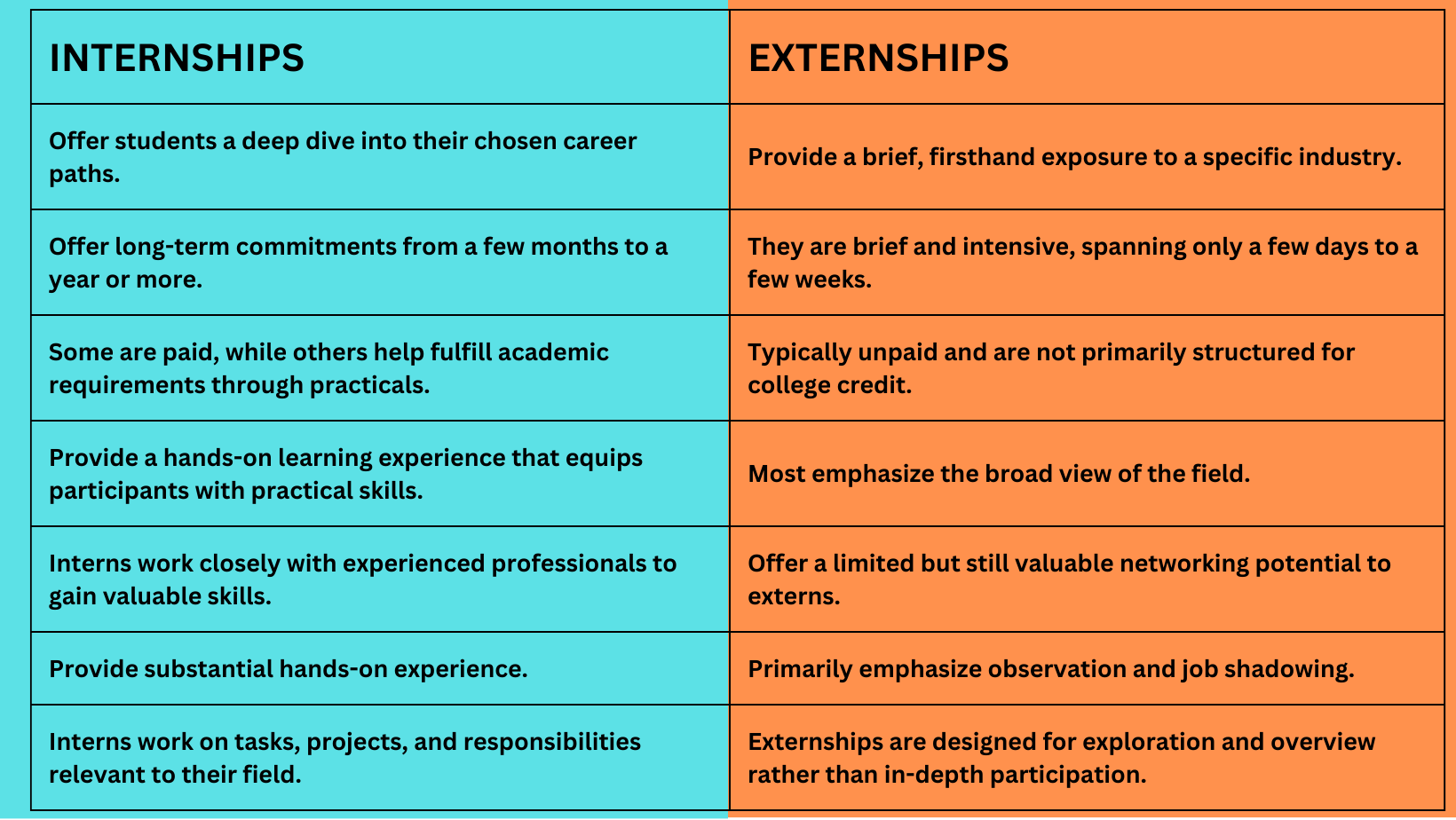
How to Write in Cursive: Basic Guidelines With Examples
Unlock the art of cursive writing with our step-by-step guide. Learn the elegant strokes, master lowercase and uppercase letters, and elevate your written communication today.
Read MoreAfter finishing college education, many people grapple with finding the best placement that will shape their career path. The beginning of almost every career journey is frequently characterized by a confusing maze of choices, self-discovery, and uncertainties.
Internships and externships are two paths that are related but different, each holding the promise of skill enhancement and real-world experience.
If you find yourself at the crossroads of these enticing options, wondering which door to open, fear not. Acemyhomework experts are here to guide you through your unique aspiration.
Prepare yourself for an exciting journey exploring experiential learning, networking, and the distinct experiences on both sides of the internship-externship divide.
An internship is a structured, hands-on learning experience in which students or recent graduates work within an organization to gain practical skills and industry knowledge.
Interns engage in meaningful tasks and projects related to their field of study or career interests, often as temporary employees.
They provide valuable exposure to the professional world, networking opportunities, and a deeper understanding of the specific responsibilities within a chosen industry.
An externship is a short-term educational experience where individuals, often college students or aspiring professionals, shadow experts in a specific field or industry.
It's primarily observational, allowing participants to gain insights into a profession's day-to-day activities, work culture, and demands. Externships are typically brief, lasting from a few days to a few weeks.
Both internships and externships share common elements, although they have distinct goals and objectives.

Internships and externships serve distinct goals and objectives.
Internships: These immersive and extended programs offer students and recent graduates a deep dive into their chosen career paths. Internship programs involve hands-on work, where participants gain practical skills, industry insights, and valuable networking connections.
Lasting for several months, internships are designed to provide a comprehensive learning experience in a real-world work environment, bridging the gap between education and employment.
Externships: They are more concise and focused on observation and job shadowing. They aim to provide a brief, firsthand exposure to a specific facet of a profession or industry.
Externship participants can explore this aspect in depth, helping industry professionals make informed decisions about their career interests. Internships emphasize skill development and immersion, while externships focus on exploration and career alignment.
The duration of internships and externships varies significantly.
Internships: Offer long-term commitments from a few months to a year or more. They are flexible regarding part-time or full-time engagement, allowing participants to delve deeply into their chosen field. Clients gain substantial experience and contribute meaningfully to the host organization.
Externships: They are brief and intensive, spanning only a few days to a few weeks. Externships tend to focus on providing a concentrated overview of a specific aspect within a profession, allowing participants to gain quick insights without the extended time commitment of internships, making them ideal for career exploration and short exposure.
The academic credit earned distinguishes internships and externships.
Internships: They often provide students the dual benefit of gaining real-world experience while earning a college credit. Some internships are paid, and others offer credit through partnerships with educational institutions, allowing students to fulfill academic requirements and build a practical skillset.
Externships: They are typically unpaid and are not primarily structured for college credit. They serve as invaluable informational and exploratory experiences, offering insight into a specific area within a field. While both are valuable learning opportunities, internships more directly bridge the gap between academic study and professional experience through credit-based arrangements.
Internships and externships cater to distinct purposes regarding skill development and career exploration.
Internships: They are skill-oriented and focus on honing specific competencies. Internships provide a hands-on learning experience that equips participants with practical skills relevant to their chosen field. They offer an in-depth understanding of job responsibilities and industry intricacies hence students can acquire valuable learning experiences.
Externships: Most emphasize career exploration. They enable participants to investigate various aspects of a profession or industry, aiding them in making informed career decisions. While externships provide exposure and some skill development, their primary goal is to offer a broad view of the field, leaving the depth of skill acquisition to internships.
Networking and connections vary between internships and externships.
Internships: They afford ample opportunities to build a substantial professional network due to their extended duration. Interns work closely with experienced professionals and colleagues over an extended period, fostering relationships valuable for future job prospects, mentorship, and industry insights.
Externships: They offer a limited but valuable networking potential by being shorter and more focused on observation. Although externs may have a different depth of interaction, they can connect with professionals in their chosen area and gain insights into their network, which can be beneficial for initial contacts and exploring the industry's landscape. The extent of networking opportunities aligns with the program's duration.
The qualification requirements for internships and externships differ in their flexibility.
Internships: They are typically more stringent, often necessitating specific qualifications, such as enrollment in a degree program or completion of relevant coursework. Employers may expect interns to possess certain academic knowledge or skills.
Externships: They tend to have fewer prerequisites, primarily focusing on offering insights to a broader audience. Externs may not need to meet stringent academic or skill-based criteria, making these programs more accessible for a broader range of participants, including those exploring career options or seeking brief industry exposure.
The level of hands-on experience distinguishes internships and externships.
Internships: Most internships provide substantial hands-on experience, as interns are expected to contribute to the organization's operations actively. Interns work on tasks, projects, and responsibilities relevant to their field, gaining practical skills and industry knowledge. This deep involvement allows interns to understand the day-to-day dynamics of their chosen profession.
Externships: They primarily emphasize observation and job shadowing, offering limited hands-on experience. Participants witness professionals in action and have the opportunity to ask questions and gather insights.
Attendees may not actively engage in the same degree of project-based work as interns. Externships are designed for exploration and overview rather than in-depth participation.
Externships offer several valuable benefits for individuals exploring a particular field or industry:
Career Exploration: Externships provide a low-risk opportunity to gain experience or firsthand exposure to a profession or industry, helping individuals determine if it aligns with their career goals.
Networking: Participants can make initial connections with professionals in the field, potentially leading to mentorship, job referrals, or valuable insights into the industry.
Informed Decision-Making: Externships allow individuals to make more informed career choices by providing a concentrated experience in a specific aspect of a profession.
Resume Enhancement: Completing an externship adds credibility and experience to a resume, making it more appealing to potential employers.
Learning from Experts: Participants can learn from experienced professionals, gaining valuable insights and industry-specific information.
Confidence Building: Externships can boost confidence and motivation by confirming or redirecting career interests.
Internships offer a wide range of benefits to individuals looking to gain practical experience in their chosen field:
Skill Development: Interns acquire hands-on skills and practical knowledge relevant to their field, enhancing their professional competence.
Industry Insights: They gain a deep understanding of industry-specific practices, trends, and challenges, which can be invaluable for future roles.
Networking: Internships provide opportunities to build a professional network, connecting with experienced colleagues, mentors, and potential employers.
Job Opportunities: Many interns receive job offers from host organizations or leverage their internship experience to secure employment elsewhere.
Personal Growth: Internships boost confidence, adaptability, and interpersonal skills, facilitating personal and professional development.
Income Potential: Paid internships offer financial compensation, helping cover living expenses and offsetting the cost of education.
With the job market dwindling globally, it has been a tussle for people to find good externships and internship programs for their professional development.
In fact for college students, landing an internship program while you are still in school is a flex that everyone wishes for. So, what are some of the things you must do to land the best internship opportunities? The following insights will guide you to land the opportunity you want.
As the saying goes, the early bird catches the worm. You need to start applying for internships/externships as soon as you get into college. Prepare as early as possible and start looking for various job offers.
Employers hire graduates, undergraduates, and students for internships far sooner than you may imagine. To be on the safe side, you need to start drafting a resume, cover letter, or recommendation letter that will help you land internship or externship opportunities.
Professors are usually aware of the many externships and internship opportunities offered by colleges and other professional industries.
Using the networks, of your internship coordinator, you can leverage the opportunity to find the right career connections that will help you gain hands-on experience in your field.
If any of your lecturers introduce you to a company or professional, strive to make an outstanding first impression by expressing your views on how you plan to make an impact on the organization.
The smartest way to land externships and internships is to network. Start by attending any networking events hosted in your school or any forum that is related to your career field.
You can also utilize social media, such as Glassdoor, and LinkedIn, to see whether any of your connections work for organizations that provide student work experience.
If you want to work for a corporation, don't be afraid to approach them personally. Make contact via phone or email, engage with successful employees you know, and request introductions through your family's networks.
It is vital to look for mentors or industry sponsors who have already advanced in your careers and will lead you to the best employment opportunities.
Internships and externships unlock doors to skill mastery, networking, and informed career decisions. You can get practical training and transform your career path by securing the best internship or externship opportunities for yourself. Try your best to actively seek out numerous internship opportunities to learn the specialized duties of your chosen career.
This determination will not only enrich your educational experience, but will also improve your job prospects and future career chances dramatically.

Get affordable and top-notch help for your essays and homework services from our expert tutors. Ace your homework, boost your grades, and shine in online classes—all with just a click away!



Fast, secure, and handled by vetted experts.

Unlock the art of cursive writing with our step-by-step guide. Learn the elegant strokes, master lowercase and uppercase letters, and elevate your written communication today.
Read More
Do you need inspiring senior project ideas? Discover a world of innovation with our curated list of 100+ senior project ideas. Unleash your creativity and embark on a transformative experience with these exciting ideas.
Read More
Learn how cumulative and comprehensive assessments differ and discover practical strategies for success in each. Navigate the insights and tips for mastering both exam types.
Read More